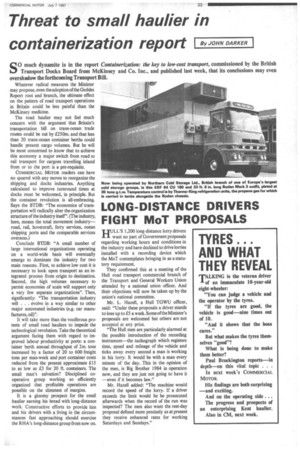Threat to small haulier in
Page 35

If you've noticed an error in this article please click here to report it so we can fix it.
containerization report By JOHN DARKER SO much dynamite is in the report Containerization: the key to low-cost transport, commissioned by the British Transport Docks Board from McKinsey and Co. Inc., and published last week, that its conclusions may even overshadow the forthcoming Transport Bill.
Whatever radical measures the Minister may propose, even theadoption of the Geddes Report root and branch, the ultimate effect on the pattern of road transport operations in Britain could be less painful than the McKinsey medicine.
The road haulier may not feel much concern with the argument that Britain's transportation bill on trans-ocean trade routes could be cut by £250m. and that less than 20 trans-ocean container berths could handle present cargo volumes. But he will be most concerned to know that to achieve this economy a major switch from road to rail transport for cargoes travelling inland from or to the port is a pre-requisite.
COMMERCIAL MOTOR readers can have no quarrel with any moves to reorganize the shipping and docks industries. Anything calculated to improve turnround times at docks must be welcomed, in principle. But the container revolution is all-embracing. Says the BTDB: "The economics of transportation will radically alter the organization structure of the industry itself". (The industry, here, means the total movement industry— road, rail, hovercraft, ferry services, ocean shipping ports and the comparable services overseas.) Conclude BTDB: "A small number of large international organizations operating on a world-wide basis will eventually emerge to dominate the industry for two main reasons. First, to achieve low cost it is necessary to look upon transport as an integrated process from origin to destination. Second, the high volumes necessary to permit economies of scale will support only a very few separate organizations". Then, significantly: "The transportation industry will . . . evolve in a way similar to other major automated industries (e.g. car manufactures, oil)".
It will take more than the vociferous protests of small road hauliers to impede the technological revolution. Take the theoretical argument facing them with regard to improved labour productivity at ports: a container berth annual throughput of 2m. tons increased by a factor of 20 to 600 freight tons per man-week and port container costs reduced from the present approximate £15 to as low as £3 for 20 ft. containers. The small man's salvation? Disciplined cooperative group working so efficiently organized that profitable operations are possible on the slimmest of margins.
It is a gloomy prospect for the small haulier earning his bread with long-distance work. Constructive efforts to provide him and his drivers with a living in the circumstances fast approaching should exercise the RHA's long-distance group from now on.




































































































































